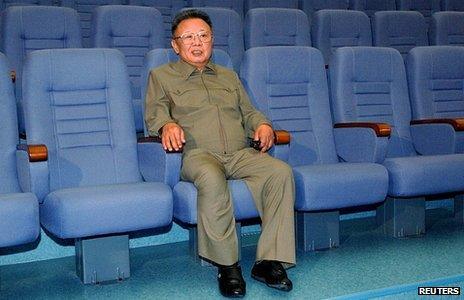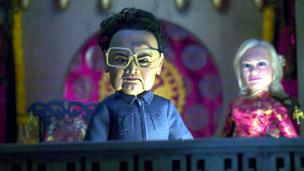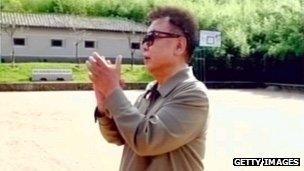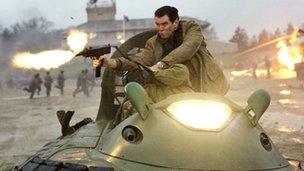Kim Jong-il: The cinephile despot
- Published

Kim Jong-il in Pyonyang's State Theatre, October 2009
One of the more surprising facts about Kim Jong-il was his love of cinema. He reportedly owned more than 20,000 videos and DVDs and counted Elizabeth Taylor among his favourite actresses.
"The cinema occupies an important place in the overall development of art and literature. As such it is a powerful ideological weapon for the revolution and construction."
So wrote Kim Jong-il in his 1987 essay The Cinema and Directing.
Countless leaders have recognised film's potential for propaganda. But for the North Korean leader, who has died aged 69, cinema was much, much more.
His enormous collection of video cassettes incorporated everything from Hollywood westerns to Japanese monster movies.
Kim also wrote several treatises on cinema, often with surprising insight into the creative process.
Many Hollywood scribes could take note of the following gem: "A film with an untidy plot cannot grip the audience and define their emotional response."
At other times, Kim's writings seem more like a thinly-veiled rule book for would-be dictators.
"No production of high ideological and artistic value can evolve out of a creative group whose members are not united ideologically and in which discipline and order have not been established," he decreed in 1987.
Kidnap
But Kim's appetite for cinema went to bigger, and stranger, extremes.
In 1978, long before he succeeded his father Kim Il Sung, he ordered the kidnapping of South Korea's most famous film director.

Kim was portrayed as a speech-impaired, isolated dictator in Team America: World Police
Shin Sang-ok was abducted during a trip to Hong Kong. Agents shoved him into a waiting car, threw a bag over his head and transported him, wrapped in plastic, to Pyongyang.
He was kept in an all-male prison for several years and was forced to survive on a diet of "grass, salt and rice" as punishment for trying to escape.
After four years he was suddenly released and reunited with his wife, Choe Eun-hui, at a lavish government party.
In his autobiography, Shin recalled a conversation with Kim Jong-il over soft drinks at the event.
"The North's filmmakers are just doing perfunctory work," said Kim, at the time the country's culture minister. "They don't have any new ideas.
"Their works have the same expressions, redundancies, the same old plots. All our movies are filled with crying and sobbing. I didn't order them to portray that kind of thing."
And so, Shin and Choe were put to work as film-makers for the regime.
Among the seven movies they released while under Kim's command was Pulgasari, a communist version of Godzilla, and a drama that included the country's first on-screen kiss.
Their situation was not comfortable - they were essentially under house arrest when they were not on set. But Shin said he had unparalleled access to the reclusive Kim.
"He listened to me because we were from South Korea," Shin told The Guardian, external in 2003. "Even though we criticised some things, he wanted us to be honest. Others would have been killed for speaking so honestly".
Shin and his wife finally escaped during a trip to Vienna in 1986, shortly after completing work on Pulgasari.
The monster movie remains one of the few North Korean films available internationally (it can also be seen on YouTube, external) and comes complete with an executive producer credit for Kim Jong-il.
The plot revolves around a small doll that magically comes to life when it touches blood.
The doll grows into a giant, metal-eating monster that helps peasants overthrow their leader, only to find themselves enslaved by the creature's constant desire for resources - a metaphor for capitalism.
Cinematically, the battle scenes - which featured more than 10,000 extras - cannot fail to impress.
But the special effects and "terrifying" man-in-Godzilla-suit are dated, feeling more like that of a 1950s B-movie than the $3m 1980s production it was.
Manipulation
International approval was presumably low on Kim's list of priorities.
An anonymous defector, interviewed in Kong Dan Oh's book Through the Looking Glass, described how cinema affected the ordinary Korean citizen.
"This defector recounts how he was moved to tears by a North Korean film, heavily laden with propaganda," said the author.
"When he saw the movie again after fleeing to South Korea, the work struck him as absolutely silly."

Kim Jong-il produced many films and documentaries, both before and after he took power
Propagating an image of successful, ordered, prosperous North Korea was always Kim's main goal.
Similarly, TV and film footage from the South generally portrayed protests, unrest and misery - making democracy and defection seem unappetising prospects.
Kim's micro-management of the movie industry even extended to the art departments.
"As an actress, they force you to wear certain things and not others," says Kim Hye Young, a former North Korean movie star who fled the country in the 1990s.
"People always seem to be dressed in uniforms. The state even tells you what make-up you are allowed to have."
But the films produced under his watchful eye were not all heavy-handed communist allegories.
Indeed, one sign outside the Ministry Of Culture demanded: "Make more cartoons."
Bond goes bad
Defectors from North Korea have been able to shed some light on Kim's personal taste in movies.
"Kim Jong-il was like any ordinary young man. He liked action movies, sex movies, horror movies," Shin Sang-Ok told the BBC, external in 2003.
"He liked all the women that most men like, he liked James Bond."
Elsewhere, Shin listed Kim's favourite films as Friday the 13th, Rambo and Hong Kong action films.
He also revealed to the Seoul Times that the leader's favourite actor was Sean Connery, and his favourite actress was Elizabeth Taylor.
The first Western film to be publicly screened in North Korea was Bend It Like Beckham, watched (in edited form) by 12,000 people at the Pyongyang Film Festival in 2004.

Die Another Day's North Korean sequence may have ended Kim's love affair with James Bond
Kim was also said to have been a fan of Ealing comedies, inspired by their emphasis on team spirit and a mobilised proletariat.
Former US Secretary of State Madeline Albright also gleaned a direct insight into the Korean cineaste's habits during a state visit in 2000.
According to the New York Times, external, Kim asked Albright if she had seen any recent films.
When she replied "Gladiator", Kim said he had seen Steven Spielberg's Amistad, which he described as "very sad".
He also told Wendy Sherman, who was in Pyongyang as a special advisor: "I own all the Academy Award movies. I've watched them all."
But Kim was less than enamoured by Hollywood's portrayal of his own regime.
When his beloved James Bond was captured and tortured during a North Korean mission in Die Another Day, the government called it "insulting to the Korean nation".
But most scathing of all was Trey Parker and Matt Stone's Team America: World Police, in which a marionette of Kim Jong-il with a crudely-impersonated Korean accent sits at a piano singing: "I'm so ronrery [lonely]."
This parody of a vain and isolated leader is, to many Westerners, the presiding impression of Kim Jong-il.
Indeed, Team America became a trending topic on Twitter within hours of his death being announced.
Kim may not have approved of the caricature. But he would certainly have appreciated cinema's power to shape people's minds.
- Published19 December 2011